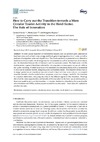Please use this identifier to cite or link to this item:
https://accedacris.ulpgc.es/jspui/handle/10553/63900
| DC Field | Value | Language |
|---|---|---|
| dc.contributor.author | Florido de la Nuez, María del Carmen | en_US |
| dc.contributor.author | Jacob, Marta | en_US |
| dc.contributor.author | Payeras, Margarita | en_US |
| dc.date.accessioned | 2020-01-22T12:38:36Z | - |
| dc.date.available | 2020-01-22T12:38:36Z | - |
| dc.date.issued | 2019 | en_US |
| dc.identifier.issn | 2076-3387 | en_US |
| dc.identifier.other | WoS | - |
| dc.identifier.uri | https://accedacris.ulpgc.es/handle/10553/63900 | - |
| dc.description.abstract | Tourism causes important environmental impacts and can generate great pressure on local resources, such as land, water, energy and food, generating large amounts of waste, as well as problems of congestion, noise and air pollution. The circular economy is presented as an alternative model to the linear model, which recognizes the fundamental role of the environment, its functions and the interaction between the environment and the economic system. The hotel sector and the tourism sector in general, have been criticized for not adequately addressing environmental problems and global warming. In order to carry out the transition to a circular economy (CE), it is essential to innovate in business models, designing a circular business model. The objective of this work is to design guidelines on possible actions and opportunities that allow us to carry out a successful transition towards a circular model in hotel companies, as well as to design a model for this transition in a tourism destination, analyzing the roles of the different agents in this transition. Findings identified the main opportunities and benefits of this transition in the hotel sector and describes a three-axis model to carry out this transition in a tourism destination, identifying the roles of public administrations and DMOs, resident population and the tourism sector. Future research implications are also discussed. | en_US |
| dc.language | eng | en_US |
| dc.relation.ispartof | Administrative Sciences | en_US |
| dc.source | Administrative Sciences[ISSN 2076-3387],v. 9 (2) | en_US |
| dc.subject | 531290 Economía sectorial: turismo | en_US |
| dc.subject.other | Environmental management | en_US |
| dc.subject.other | Hotels | en_US |
| dc.subject.other | Strategies | en_US |
| dc.subject.other | Behavior | en_US |
| dc.subject.other | Innovaciones tecnológicas | en_US |
| dc.subject.other | Hoteles | en_US |
| dc.subject.other | Turistas | en_US |
| dc.title | How to carry out the transition towards a more circular tourist activity in the hotel sector: the role of innovation | en_US |
| dc.type | info:eu-repo/semantics/Article | en_US |
| dc.type | Article | en_US |
| dc.identifier.doi | 10.3390/admsci9020047 | |
| dc.identifier.isi | 000474932200019 | - |
| dc.identifier.issue | 2 | - |
| dc.relation.volume | 9 | - |
| dc.investigacion | Ciencias Sociales y Jurídicas | en_US |
| dc.type2 | Artículo | en_US |
| dc.contributor.daisngid | 9634490 | |
| dc.contributor.daisngid | 30703023 | |
| dc.contributor.daisngid | 10434021 | |
| dc.utils.revision | Sí | en_US |
| dc.contributor.wosstandard | WOS:Florido, C | |
| dc.contributor.wosstandard | WOS:Jacob, M | |
| dc.contributor.wosstandard | WOS:Payeras, M | |
| dc.date.coverdate | Junio 2019 | |
| dc.identifier.ulpgc | Sí | es |
| dc.description.esci | ESCI | |
| item.fulltext | Con texto completo | - |
| item.grantfulltext | open | - |
| crisitem.author.dept | GIR TIDES: Economía, medioambiente, sostenibilidad y turismo | - |
| crisitem.author.dept | IU de Turismo y Desarrollo Económico Sostenible | - |
| crisitem.author.dept | Departamento de Análisis Económico Aplicado | - |
| crisitem.author.orcid | 0000-0002-9652-7231 | - |
| crisitem.author.parentorg | IU de Turismo y Desarrollo Económico Sostenible | - |
| crisitem.author.fullName | Florido De La Nuez, María Del Carmen | - |
| Appears in Collections: | Artículos | |
WEB OF SCIENCETM
Citations
38
checked on Jan 18, 2026
Page view(s)
62
checked on Jan 10, 2026
Download(s)
85
checked on Jan 10, 2026
Google ScholarTM
Check
Altmetric
Share
Export metadata
Items in accedaCRIS are protected by copyright, with all rights reserved, unless otherwise indicated.
